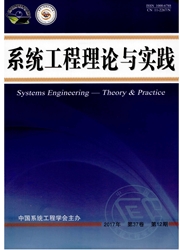

 中文摘要:
中文摘要:
本文针对供应商的资金约束问题,研究了需求不确定条件下,两个竞争的制造商如何通过资金补偿策略改善供应商的资金约束问题.建立了包含两个竞争制造商,一个供应商在内的两阶段动态博弈模型,并给出了制造商的均衡补偿及均衡订货策略,进而分析了制造商的资金机会成本和供应商的资金水平对均衡补偿策略的影响.研究表明:当资金机会成本或供应商的资金水平低于某个临界值时,两个制造商均提供资金补偿;当资金机会成本或供应商的资金水平高于某个临界值时,两个制造商均不提供资金补偿;其余情况下,只有一个制造商提供资金补偿.最后,当供应商不提供批发价折扣时,越多的制造商进行资金补偿,供应商的收益越大.
 英文摘要:
英文摘要:
Based on a supplier's capital constraint problem, how two competing manufacturers improve the supplier's capital constraint by adopting financial subsidies under uncertain demand was investigated. A two-stage model with two competing manufacturers and a supplier was built. Meanwhile, manufacturers' equilibrium subsidies and equilibrium ordering decisions were provided. Moreover, the impacts of the manufacturer's financial opportunity cost as well as the supplier's capital level on the equilibrium subsidies were characterized. It reveals that, when the financial opportunity cost or the supplier's capital level is lower than a certain threshold value, both manufacturers offer subsidies; when the financial opportunity cost or the supplier's capital level is higher than a certain threshold value, neither manufacturer offers subsidy; otherwise, only one manufacturer offers subsidy. Finally, when the supplier doesn't provide wholesale price discount, the more manufacturers offer subsidies, the more benefits the supplier gains.
 同期刊论文项目
同期刊论文项目
 同项目期刊论文
同项目期刊论文
 期刊信息
期刊信息
